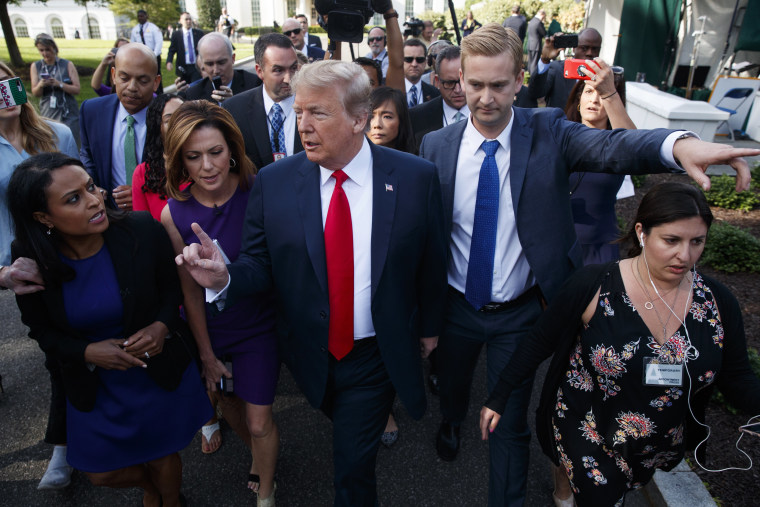It's been nearly a week since four Americans -- two U.S. service members, a Defense Department civilian employee, and a contractor supporting the department -- were killed by an explosion in Syria during a routine patrol. Three other U.S. service members were injured as part of the same attack.
As NBC News reported, "ISIS claimed responsibility for the attack through recognized social media accounts, claiming a suicide bomber wearing an explosive vest attacked coalition forces."
On Saturday morning, Donald Trump traveled to Dover Air Force Base for a private meeting with the fallen Americans' loved ones, and the president spoke briefly with reporters before boarding Marine One. In response to a question about the ongoing ISIS presence in Syria, he said:
"Well, what we've done is we've -- when I took over, Syria was loaded with ISIS.... We've gone into Syria, and in two years we've, I guess, reduced it to about 99 percent of the territorial caliphate."Now, that doesn't mean you're not going have somebody around. And who knows what happened and who it was, because nobody is sure."
On the first point, the fact of the matter is that ISIS-controlled territory "had been substantially reduced before Trump took office," though the Republican often likes to pretend otherwise.
But on the second point -- "nobody is sure" what happened in last week's attack -- it was an unexpected thing for Trump to say, and I'm curious as to why he said it.
It's possible, for example, that the president was simply being cautious about the details of an attack that isn't yet fully understood. ISIS claimed responsibility for the deaths of four Americans, but the terrorist network has lied before and claimed credit for violence it had nothing to do with. What's more, the deadly explosion was in the Syrian city of Manbij, and as NBC News reported, this is not a city known for its significant ISIS presence.
When Trump said on Saturday, "Who knows what happened," maybe he was simply leaving open the possibility that ISIS falsely claimed responsibility.
There is, however, a more cynical possibility.
When the American president announced the withdrawal of U.S. troops from Syria, he bragged to the world that the United States has "defeated" ISIS. If ISIS was responsible for killing four Americans in Syria less than a month after Trump's declaration, it would cast his boasts in an embarrassing light.
Indeed, this was of particular interest last week when Vice President Mike Pence condemned the attack that left four Americans dead in Syria, but he added that ISIS "has been defeated," just hours after ISIS took credit for the attack.
So, did Trump say "nobody is sure" who killed those Americans because of genuine uncertainty about who's responsible, or because the White House's rhetoric about ISIS's demise would look a lot worse if ISIS's claims about the attack were true?
On "Fox News Sunday" yesterday, Chris Wallace noted Wednesday's deadly attack and the White House's rhetoric. "Is that what the defeat of ISIS looks like?" the host asked.
After extending his condolences to the fallen Americans' families, Pence criticized the Obama administration before eventually saying, "In a very real sense, the ISIS state has been defeated."
On CBS's "Face the Nation," the same thing happened: the vice president expressed some sorrow, blamed Barack Obama for a while, and concluded, "The ISIS state has been defeated."
Here's hoping this isn't why Trump declared over the weekend, "[W]ho knows what happened and who it was, because nobody is sure."
Postscript: I'm not sure why Pence kept referring to "ISIS state." It's commonly understood that the first "s" in "ISIS" stands for "state," which made it sound as if the vice president was effectively saying, "Islamic State state." Was this some kind of odd effort to parse the truth?
